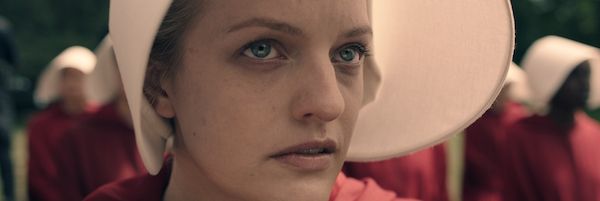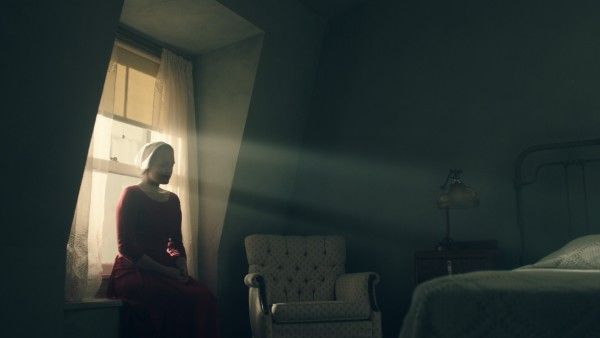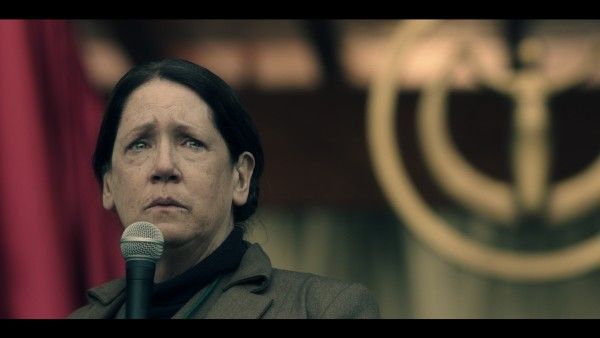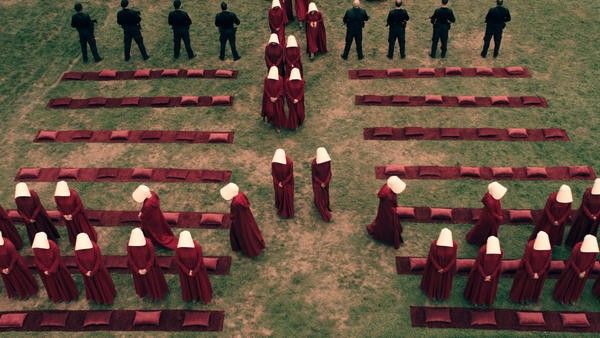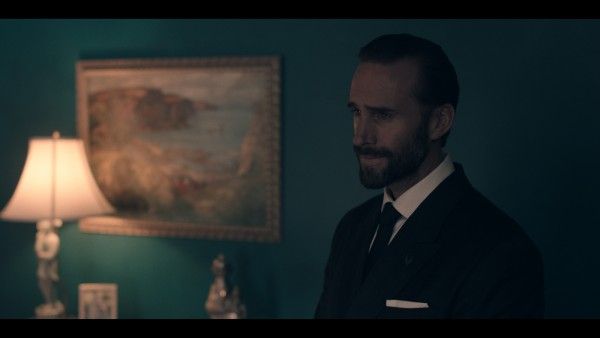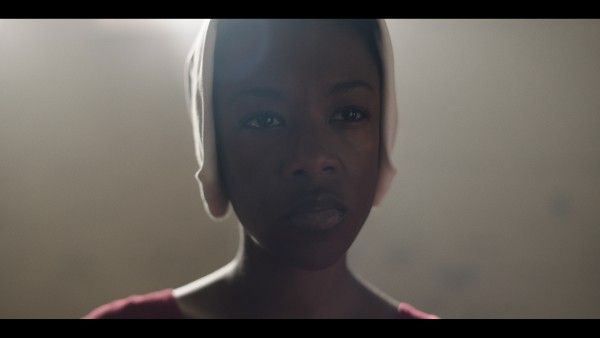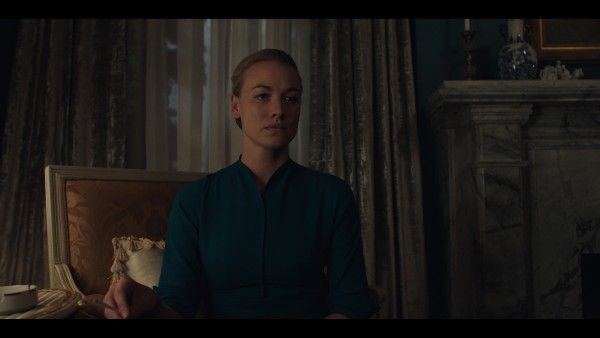If you’ve been keeping up with talk of Hulu’s adaptation of The Handmaid’s Tale, you’ll know the main praise has focused on the fact that the series’ portrait of a dystopian future has never felt more real or more relevant. After watching the three episodes provided to critics, I can confirm that this is absolutely true -- and it shouldn't be ignored. Handmaid is based on Margaret Atwood’s extraordinary novel, and showrunner Bruce Miller has every aspect of it is worth recommending. Yet its haunting echo of fears about the United States’ current political administration create another layer of exceptionalism. Make no mistake, this is a political work. But it makes its case in a way that, like George Orwell’s 1984 or even recent episodes of Black Mirror, reflects our world back at us in a funhouse mirror that is both familiar and perverse.
One of Handmaid’s greatest successes is how (much like Atwood’s novel) it tells its future-set story in a way that is grounded closely in an intimate, personal experience. The story belongs to Offred (Elisabeth Moss), the generic name given to our heroine after the collapse of the U.S. government and the rise of Gilead. The details of how the repressive Gilead regime came to be in power, and what things look like outside of the closely-guarded streets where Offred lives in the house of Commander Waterford (Joseph Fiennes), is revealed slowly through unstructured flashbacks, which are deeply affecting from the very start.
Gilead is built on extreme religious fundamentalism, taking away all notions of God’s grace and the sacrifice of Christ, in service of a patriarchal society that relies on “traditional values.” Sound familiar? Massive drops in fertility because of environmental toxins is seen as a creator’s punishment of women for an inherently sinful nature. So in an attempt to “rectify” this, Gilead banned women in the workplace, reallocated their money and property, and created a new structure of categorization that is chilling to witness. Barren women from wealthy families marry well and run households (like Mrs. Waterford, played by Yvonne Strahovski), while poor barren women become servants (known as Marthas). The few who have been proved fertile become handmaids, and are paired with Commanders and ceremonially raped in a sick pantomime where the wives experience both the sexual act and later, the birth of a baby, by proxy.
It’s all absolutely insane, but Handmaid mitigates that by keeping its scenes quiet, structured, and populated with primary colors. But it all really comes alive in Offred’s narration. Here, Offred’s inner voice isn’t used for exposition or to repeat what we’re seeing play out, but rather to offer an alternative commentary. It’s a necessary one, as she struggles to survive in the hopes that one day she can be reunited with her daughter, who was taken from her when Offred was subjugated.
The series is gorgeously directed, which in its own way acts as another juxtaposition to the horrors witnessed (rape, group murder, police brutality, genital mutilation, public hangings), allowing Handmaid to show the visual disconnect between the artificial world of peace that Gilead has created versus its sick reality. There are a number of twists in each episode that book readers may remember, but there are some new surprises as well, especially through the expanded stories and viewpoints the series offers. It all makes Handmaid, more than ever, feel like a horror series, where its protagonists are trapped in a shared prison no one can speak of.
But all eyes should be trained on Moss, who again knocks it out of the park as a woman who must be meek in order to survive, but whose inner self is screaming to be released. Every movement, every eye flutter, and every rare word is handled with extreme caution, so that when we see her character before the rise of this totalitarian regime she seems wildly uninhibited even though she's just being normal. “This will all become ordinary,” a stern instructor known as Aunt Lydia (Ann Dowd) tells the newly-captured women who are chosen as handmaids. It’s a dark joke, in a way, as we see more of how the rise of Gilead came to be — slowly normalized as private armies were marshaled, civil rights were destroyed, casual hatred became the norm, academics are sent to work camps, the constitution is suspended, and power was transferred completely to white, straight men. Friends disappear from around Offred, including a college best friend, Moira (Samira Wiley) and her assigned shopping partner Ofglen (Alexis Bledel), as paranoia and suspicion consumes the environment around them.
The Handmaid’s Tale takes its time to unfold the various processes of Gilead, how things are structured, the rules, and the rituals. Most are savage and brutal, and yet, they are also restrained. Brief descriptions of what life is like outside of this realm allow the imagination to run wild, but Handmaid remains staid and quiet, punctuated by bursts of violence. It’s spellbinding, especially as we see the incredibly smart Offred realign what agency she has left in a society where people are just bodies, and women turn on each other in an attempt to gain back any possibility of restored power. But, guttingly, there is none to be had.
Hulu has not found the same success as its streaming rivals Netflix or even Amazon when it comes to original content. The now out-of-fashion weekly release schedule may be in large part to blame, but even its high-profile dramas like The Path and 11.22.63 have failed to catch on in the zeitgeist. With Handmaid’s Tale, Hulu has gone for broke both in marketing and in allowing the series to be crafted in a way that simply cannot be ignored. In a smart move, the streaming platform is releasing the first three episodes at once, then moving to a (less great) weekly format again. But those three episodes should be enough to get viewers hooked. It is life through a looking glass, and it is our duty not to turn away.
Rating: ★★★★★ Excellent — Haunting, extraordinary storytelling
The first three episodes of The Handmaid’s Tale premiere Wednesday, April 26th on Hulu; the remaining episodes will be released weekly after that.

